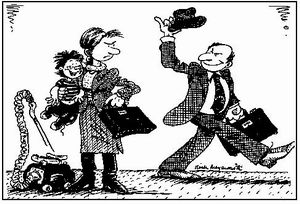A ROUSING OUI FOR MARRIED MEN
How wedlock affects careers
Whenever French Sociologist François de Singly stopped in his wife's office in the early evening, the pattern was almost always the same : the married men and the single women were working overtime, and nearly all of the single men and married women had gone home.
De Singly decided to do a study on the matter. The result, a 14-page report that has triggered substantial interest in the French press helps confirm one of the assertions of American feminism : marriage helps men in their careers and hinders women.
Basing his study on surveys going back to 1970 that covered 37,843 French workers from all income levels and all kinds of jobs, de Singly analysed data for executive achievement in the 35-to-52 age bracket. Married men far outscored single men, and single women far exceeded married women. Among all men and women with at least two years of professional or university training, 43% of married men reached the executive level, compared with about 29% for single men, 21% for single women and a feeble 6% for married women.
De Singly's conclusion : married men do best and married women worst, because in traditional marriage the wife lives to support her husband's career and takes her own less seriously. That doesn't happen for a single man or woman, and certainly not for a married woman who is charged with performing domestic tasks.
But why should the single male score so poorly ? Despite all the job prejudices that favor males, he barely outperforms the single woman. De Singly's answer echoes that of the American writer George Gilder in his book Naked Nomads : the single male is a kind of social misfit who earns half as much as married men and less than single women. In the U.S. he is more likely than a married man to commit suicide, become a criminal, be institutionalized.
"On the truly high educated level," de Singly says, "statistics show that it is almost normal for a woman to be single, while the case is not the same for men." For a male, he says unkindly, being single "may already represent a kind of maladjustment."
In fact, what de Singly calls the one surprise in the study is that among single people with three or more years at a university, single women have a better chance of reaching the executive level than single men. His explanation : French women who have overcome the obstacles of three years at traditionally male-dominated French universities are tougher than single males.
TIME, may 1996

![]() Download
document (Word format)
Download
document (Word format)
Activities
(Print the document before doing the activities)
Match each paragraph with its content
Answer questions about the document (QCM)